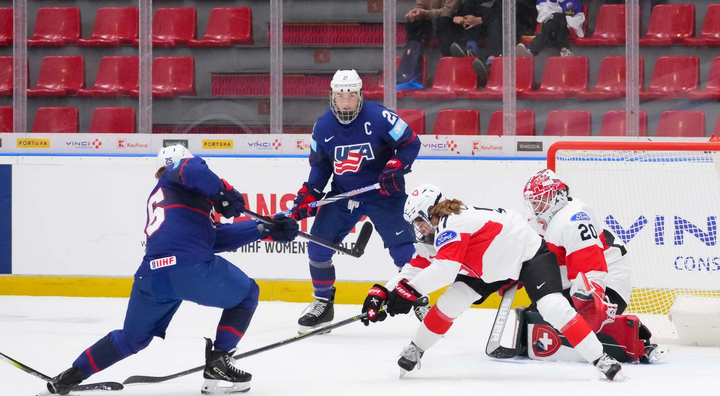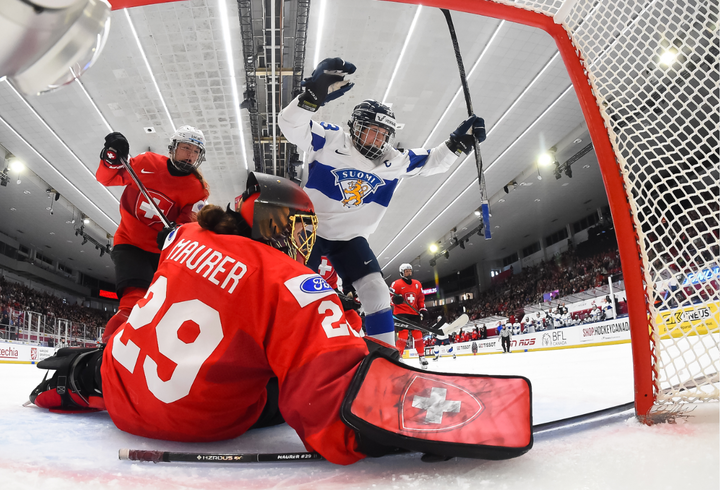Sommer West steps down from Furies bench
It's not goodbye, just see you later for West, who's taking a break from the Furies after a long career in the league.
Sommer West is a women’s hockey mainstay as both a coach and player, so when news broke recently that the Toronto Furies were looking to fill her vacant coaching position, it was another sign of big changes for the Toronto organization that is already facing quite a bit of player turnover with a new general manger also in place.
West was part of the original NWHL and CWHL, playing for the Toronto Aeros, Mississauga Chiefs, and Burlington Barracudas, retiring as a point-per-game player. After her playing career ended, she took up coaching soon after in 2012. She coached the Furies from 2012 to 2017, winning coach of the year honors and the league championship in 2014.
Some may have already heard about why she’s stepping away, but she spoke to The Ice Garden about her reasons for leaving, her hockey plans for the future, and her memories of the 2014 Cup win with the Furies while providing insight into a coach’s life in the CWHL.
As of the time of publication, the team has not yet filled her position.
How did the decision to step down as coach arrive? Was it mutual, and how difficult was it?
It wasn’t an easy decision. After the birth of our daughter, a lot of things happened in our family. And for about three months I had a bad case of postpartum [depression/anxiety]. After I got my life back on track and I started to enjoy life a lot more with my child, I just thought that it was right for me to stay home this winter to be with her. Missing out on three or four months of her life not being there mentally really took a toll on me. It was a personal decision on my behalf.
I don’t look at it as me leaving the Furies, I’m just stepping away for a year. Hopefully next year I can return in some fashion to the league or the team. As of right now, I’m trying to help [new Furies GM] Nicole [Latreille] make sure that atmosphere that Rebecca [Michael] and I had established as the staff there remains the same. The girls really enjoy playing hockey there. The involvement with the community has grown and that’s a big part of who the Furies are. But I think Nicole will do a great job of putting staff together there that will help the girls.
It will be the first in 37 years of my life that I won’t be around hockey. I want my daughter to grow up around hockey as it’s a big thing in our family and I think she’ll really enjoy it, being as outgoing as she is at seven months old.
I don’t look at it as me leaving the Furies, I’m just stepping away for a year.
Did the notion of extended travel to China next season affect your decision?
I think I would have made the same decision regardless but at the same time, I’m a person -- whether as a player or coach -- who gives a hundred percent to what I’m doing. Going through postpartum last year, it was tough for my family but I always tried to maintain contact with the coaching staff to make sure practices were ready or video was being watched -- I did everything I possibly could while I was under the weather, to say the least. Knowing they’re going to be traveling as much as they will be this winter, I would be leaving my daughter behind and I don’t think I can do that right now with the way things started [after pregnancy].
How are you helping the Furies prepare for next season from the sidelines?
I’m hoping to get some information on the kids coming out to the draft, putting tryouts together, hiring a staff, just anything to help make the transition easy for everybody.
What did you see last season out of rookies Renata Fast and Erin Ambrose and what do you expect out of them in the future?
When they came in, they were nothing short of what I’d heard. Renata is a quiet leader and pushes teammates to the best of their abilities and beyond. Erin is more vocal and expects a lot from teammates. Them being able to hit the ground running was allowing them to be themselves while asking them to fit within our system. These kids come out of university and have played at high levels so when they have ideas, sometimes you have to listen and compromise. It’s not 'what-I-say-goes' all the time -- although sometimes it is that way -- but they’re very smart people. We all respected on another.
With Olympic centralization and with some North Americans signing in China, what are the challenges the GTA teams face in drafting well and filling talent gaps?
With us being the only two teams in the league that have to fight over draftees with one another, it’s tough this year because you may not have those top-end players coming out of the draft. It’s a good challenge though because while you may not have the high-skill players, you can still have skill players that want to work together.
What will you miss the most taking the year off?
I’ll miss the team camaraderie, I’ll miss the girls. When you get to know them away from the rink, they’re good kids. We play hockey because we love it. We’re not making big paychecks in the CWHL, it’s not our job, it’s a game. The players play until 10:30 at night and then sign autographs for an hour for kids and then play the next day and then they have to go to work on Monday. The game is the game, but growing it for these kids is important for the girls too and it’s amazing to see them giving back the way they do.
What made the 2013-14 so special given your coach-of-the-year honours and the Furies winning the Clarkson Cup?
That season was unique because when I stopped playing, I hoped to become an assistant coach and learn and hang out within the league and the next thing I knew, the Furies needed a coach. I really felt at first like I was over my head for quite a while, but although I won coach of the year, I wouldn’t have been able to do it without the players who are so smart, some of them going on to be coaches themselves. They really pushed my career along that year. Winning it all was just icing on the cake.
I remember we were in Boston [at the end of the regular season] and we were losing but tied it up in the third. Though we couldn’t tie, we had to win if we wanted to place higher for playoffs. We decided to pull our goalie in the last minute [but couldn’t score the winning goal]. The players were sad we didn’t win but they were pumped because we didn’t roll over. Because we finished fourth, we had to play our playoff games in the morning and the girls were worried about taking time off work. They went home, took care of work schedules and came to the rink to work their butts off so that they were ready.
Brooke Beazer took puck after puck after puck off the foot, off her knee, she had to be taken off on a stretcher but played the next day. Some of the veterans didn’t dress or played just a few minutes, but were all willing to fight for each other. Some were playing in the morning and going to work in the same day. You had that feeling that something special was gonna happen. When Britni Smith scored the game-winner, I got goosebumps.
What does it take to commit to a head coaching job in the CWHL?
I think it takes just as much as the players are asked to commit. We have to work outside of coaching, we have to put together practices, watch video, put lines together. As a coach, you can’t treat the players like people that work for you. We’re asking them to play their hearts out when they could possibly get hurt and not see work the next day. Finding that fine line of how to push them but not too far is one of the biggest things you have to learn. You have to learn how to deal with each player as an individual.





Comments ()